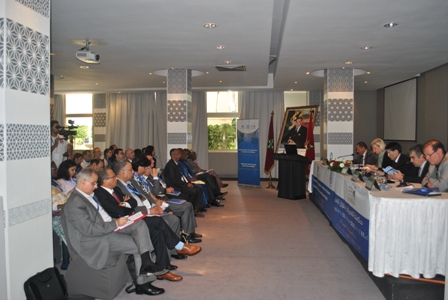MIGRATION GOVERNANCE AND HUMAN RIGHTS: CALL TO TAKE MIGRANTS’ RIGHTS INTO ACCOUNT IN MIGRATION POLICIES
The National Human Rights Council (CNDH), the Inter-ministerial Delegation for Human Rights (DIDH) and the Office of the International Organization for Migration (IOM) in Morocco organized a regional seminar on Migration Governance and Human Rights, on Friday, July 5, 2013, in Rabat.This regional gathering was organized in commemoration of the tenth anniversary of the entry into force of the International Convention on the Protection of the Rights of All Migrant Workers and Members of their Families.
Academicians and experts (from Burkina Faso, Egypt, France, Mali, Mauritania, Morocco, Spain, Switzerland, Tunisia and Senegal, government officials), representatives of national human rights institutions and non-governmental organizations, the chairman and several members of the Committee on the Protection of the Rights of All Migrant Workers and Members of their Families and representatives of the UN High Commissioner for Human Rights took part in this regional gathering.

The participants came up with several recommendations, including the following:
- taking into account the protection of human rights of migrants in the migration policies;
- strengthening multidisciplinary reflections and thoughts on migration and its national, regional and international dimensions;
- clarifying the concepts, categories and descriptions used in migration discourse and identifying the legal status of migrants;
- organizing national seminars to help prepare alternative reports of NGOs working in the field of migration;
- setting-up in national mechanisms to monitor and assess migration policies and the effective implementation of the participatory approach in this area;
- strengthening dialogue and coordination among the Maghreb States in the management of migration flows;
- creating national reporting and monitoring mechanisms (like the Moroccan Inter-ministerial Delegation for Human Rights) in the States of the Maghreb and West Africa, to monitor and follow-up the implementation of the recommendations of UN treaty bodies;
- the urgent need for a regional platform to manage of migration flows and provide the necessary conditions for a genuine governance of migration dynamics;
- establishing a permanent platform for regional NGOs specialized in the protection of migrants' rights;
- mobilizing NGOs in the region for the forthcoming World Conference on Migration;
- drafting a declaration for the seminar (Rabat Declaration 2), which aims to put migration on the agenda of the UN bodies.






















